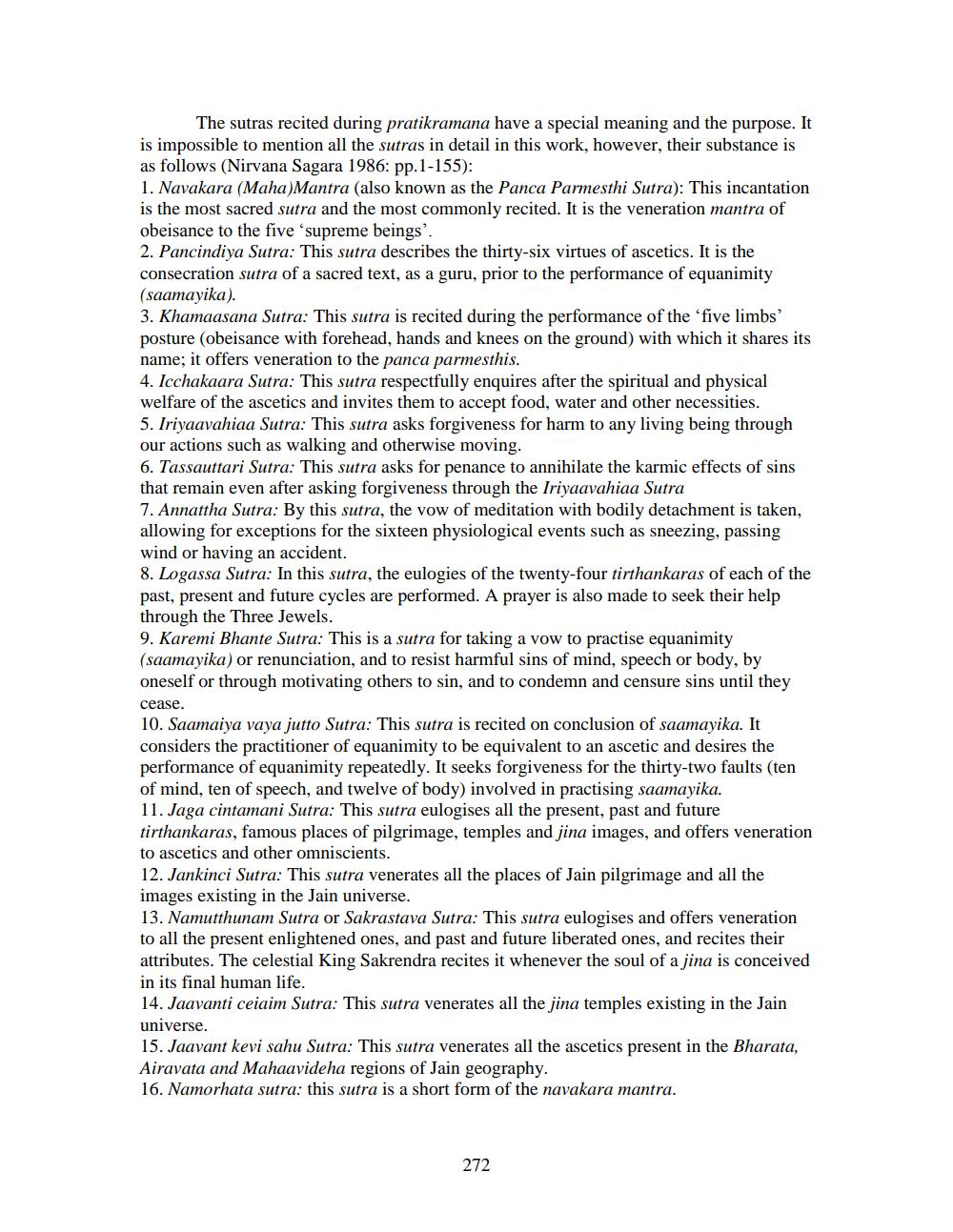________________
The sutras recited during pratikramana have a special meaning and the purpose. It is impossible to mention all the sutras in detail in this work, however, their substance is as follows (Nirvana Sagara 1986: pp.1-155):
1. Navakara (Maha)Mantra (also known as the Panca Parmesthi Sutra): This incantation is the most sacred sutra and the most commonly recited. It is the veneration mantra of obeisance to the five 'supreme beings'.
2. Pancindiya Sutra: This sutra describes the thirty-six virtues of ascetics. It is the consecration sutra of a sacred text, as a guru, prior to the performance of equanimity (saamayika).
3. Khamaasana Sutra: This sutra is recited during the performance of the 'five limbs' posture (obeisance with forehead, hands and knees on the ground) with which it shares its name; it offers veneration to the panca parmesthis.
4. Icchakaara Sutra: This sutra respectfully enquires after the spiritual and physical welfare of the ascetics and invites them to accept food, water and other necessities. 5. Iriyaavahiaa Sutra: This sutra asks forgiveness for harm to any living being through our actions such as walking and otherwise moving.
6. Tassauttari Sutra: This sutra asks for penance to annihilate the karmic effects of sins that remain even after asking forgiveness through the Iriyaavahiaa Sutra
7. Annattha Sutra: By this sutra, the vow of meditation with bodily detachment is taken, allowing for exceptions for the sixteen physiological events such as sneezing, passing wind or having an accident.
8. Logassa Sutra: In this sutra, the eulogies of the twenty-four tirthankaras of each of the past, present and future cycles are performed. A prayer is also made to seek their help through the Three Jewels.
9. Karemi Bhante Sutra: This is a sutra for taking a vow to practise equanimity (saamayika) or renunciation, and to resist harmful sins of mind, speech or body, by oneself or through motivating others to sin, and to condemn and censure sins until they cease.
10. Saamaiya vaya jutto Sutra: This sutra is recited on conclusion of saamayika. It considers the practitioner of equanimity to be equivalent to an ascetic and desires the performance of equanimity repeatedly. It seeks forgiveness for the thirty-two faults (ten of mind, ten of speech, and twelve of body) involved in practising saamayika. 11. Jaga cintamani Sutra: This sutra eulogises all the present, past and future tirthankaras, famous places of pilgrimage, temples and jina images, and offers veneration to ascetics and other omniscients.
12. Jankinci Sutra: This sutra venerates all the places of Jain pilgrimage and all the images existing in the Jain universe.
13. Namutthunam Sutra or Sakrastava Sutra: This sutra eulogises and offers veneration to all the present enlightened ones, and past and future liberated ones, and recites their attributes. The celestial King Sakrendra recites it whenever the soul of a jina is conceived in its final human life.
14. Jaavanti ceiaim Sutra: This sutra venerates all the jina temples existing in the Jain universe.
15. Jaavant kevi sahu Sutra: This sutra venerates all the ascetics present in the Bharata, Airavata and Mahaavideha regions of Jain geography.
16. Namorhata sutra: this sutra is a short form of the navakara mantra.
272




